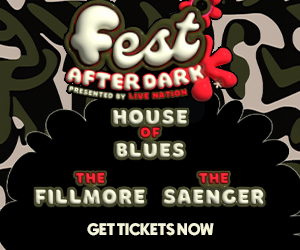Supply and demand rules business. Demand drives the supply of business services. The businesses that are astute enough to accurately forecast a demand for a certain product can usually make a killing if they can develop a product that will satisfy demand and latent demand.
But then everyone else can see a few people making a killing and they want in too. Which means that more businesses of the same kind enter the market, demand is potentially spread out amongst the competing businesses and the business that is most competitive may win out (or not). Certainly the price falls.
This little macroeconomic lesson (thank you, economics teachers!) applies to almost everything, and I think it also may apply to the festival market.
We’ve always had an abundance of festivals in Louisiana, especially in New Orleans. I think there are festivals every week in New Orleans. There are music festivals, food, literary, wine, sports, booze, theater, film, LGBT. You name it. We got it. And if it’s not an official “festival” it may be an Underwear Parade, or Nude Bikes, Southern Decadence, Running of the Bulls, Red Dress Run, Wednesdays at the Square, Thursdays in the Park, etc. etc. Then there are the multiple parades and celebrations we have almost every day. Festivals are part and parcel of what makes New Orleans unique.
We are heavily into entertainment of all kinds: festivals, parades, and don’t forget sports. New Orleans is much more attuned to sports than it was pre-Katrina.
So there are multiple—and growing—entertainment options for our citizens to enjoy and to participate in. We just had two new festivals announced in the past few weeks: the Fried Chicken Festival and the Beignet Festival.
The New Orleans metro area is roughly 1.2-million strong, and we’ve seen more people to the city, but are there enough people to patronize events? Are the entertainment options beginning to cannibalize each other? There are only so many people to buy tickets; there are only so many sponsors to support big events. There’s only so much disposable income. Is there enough money to support the growing entertainment options here? Will there be a fall-out of some of the events that haven’t quite reached their potential, or that perhaps are not marketing properly? What’s the life of a festival?
The granddaddy of them all is, of course, the New Orleans Jazz & Heritage Festival, which reached its attendance peak years ago. That festival has been refocused many times over. The attendees now are a lot different from the ones who were fest-goers 10, 15 years ago. But the Jazz Fest has managed to hone in on a market that works financially (although some would argue that since the Jazz Fest “isn’t what it used to be,” in order words, it’s changed, it’s not worth going to.
Change is inevitable. History and culture, though, are immutable. The big challenge is to honor and preserve the past, and at the same time welcome the changes that changing demographics bring to the table. If you don’t change, especially now, as future shock overwhelms everything we do, you will die. So the word “evolution” is key.
How will our entertainment and music offerings evolve. We have a lot more venues that offer many different types of entertainment. We have at least three major theaters that have come online in the last few years.
Is there now an overabundance of supply of entertainment option such that concert, festival and event promoters will start feeling the pinch? Will there be enough patrons and/or sponsor dollars and attendees to sustain all of the entertainment options in New Orleans? Will sponsors have enough money to support even the free events?
Unless we can find a way to grow the market numbers, dollars spent on entertainment could potentially be diluted to the point where no one makes enough money. Survival of the fittest? Maybe.
Does that mean some of the newer—or older—festivals won’t be able to survive?
What do you think? Do we have enough population capacity to make every single festival successful? Are there some events you could live without?




